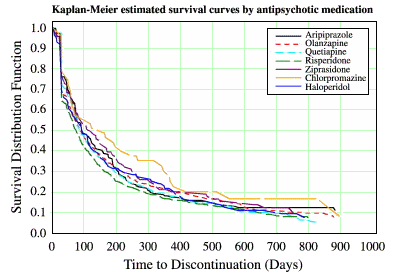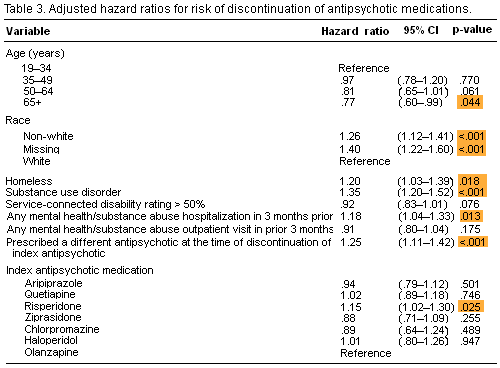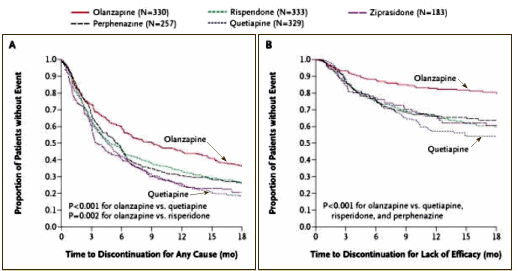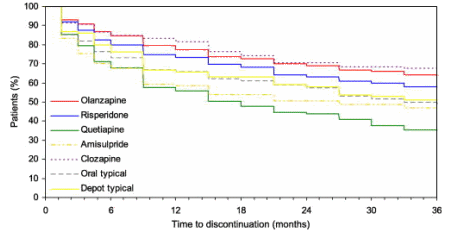Time to discontinuation of first- and second-generation antipsychotic medications in the treatment of schizophrenia.
by Kreyenbuhl J, Slade EP, Medoff DR, Brown CH, Ehrenreich B, Afful J, Dixon LB.
Schizophrenia Research. 2011 131(1-3):127-32.
BACKGROUND: Continuous adherence to antipsychotic treatment is critical for individuals with schizophrenia to benefit optimally, yet studies have shown rates of antipsychotic discontinuation to be high with few differences across medications. We investigated discontinuation of selected first- and second-generation antipsychotics among individuals with schizophrenia receiving usual care in a VA healthcare network in the U.S. mid-Atlantic region.
METHODS: We identified 2138 VA patients with schizophrenia who initiated antipsychotic treatment with one of five non-clozapine second-generation antipsychotics or either of the two most commonly prescribed first-generation agents between 1/2004 and 9/2006. The dependent variable was duration of continuous antipsychotic possession from the index prescription until the first gap of more than 45 days between prescriptions. We used the Cox proportional hazards model to compare the hazard of discontinuation among the seven antipsychotics controlling for patient demographic and clinical characteristics. The reference group was olanzapine.
RESULTS: The majority of patients (84%) discontinued their index antipsychotic during the follow-up period (up to 33 months). In multivariable analysis, only risperidone had a significantly greater hazard of discontinuation compared to olanzapine (Adjusted hazard ratio=1.15, 95% CI: 1.02-1.30, p=.025). Younger age, non-white race, homelessness, substance use disorder, recent inpatient mental health hospitalization, and prescription of another antipsychotic were also associated with earlier discontinuation.
CONCLUSIONS: Examination of a usual care sample of individuals with schizophrenia revealed short durations of antipsychotic use, with only risperidone having a shorter time to discontinuation than olanzapine. These findings demonstrate that current antipsychotic agents have limited overall acceptability by patients in usual care.



[C.A.T.I.E.]

[European Schizophrenia Study]
Among an observational sample of VA patients with schizophrenia beginning a new episode of antipsychotic treatment, the overwhelming majority (84%) discontinued their medication during the study period. This finding is consistent with the CATIE Schizophrenia study (Lieberman et al., 2005), in which 74% of pati\ents discontinued antipsychotic treatment within 18 months, and supports the results of studies in similar usual care samples ( [Cooper et al., 2005] , [Mullins et al., 2008] and [Moisan and Grégoire, 2010] ). Although several studies document similarly high rates of antipsychotic discontinuation, it is striking that only 16% of patients who discontinued their index antipsychotic in this study had a prescription filled for a different antipsychotic agent within 45 days. This suggests that a majority of patients had an interruption in antipsychotic treatment which increased their risk for serious adverse outcomes. Taken together, these findings suggest that despite the introduction of several new antipsychotic medications over the past 15 years, available treatments may not address the needs and preferences of most individuals with schizophrenia.
Although evidence-based treatment guidelines for schizophrenia recommend ongoing antipsychotic treatment for all patients and the risks of antipsychotic discontinuation can be considerable, it should not be assumed that every decision to interrupt treatment is necessarily irrational. For example, the decision to discontinue a treatment that is not providing adequate relief of target symptoms or whose side effect profile is intolerable and thus impeding rather than facilitating recovery may be a logical response, signaling the need for the patient and clinician to jointly consider an alternate treatment strategy…Contrary to our hypothesis, we found the median length of treatment for each of the SGAs and FGAs evaluated in this study to be generally similar to that of olanzapine. The only exception was risperidone, which demonstrated a statistically significantly greater risk of discontinuation compared to olanzapine, a finding that was observed in CATIE and some … but not all … previous observational studies. Our results add to the accumulating evidence that the effectiveness of olanzapine, and possibly aripiprazole and ziprasidone, may be superior in some ways to that of risperidone…
Our results did not confirm earlier findings … of a greater risk of treatment discontinuation for quetiapine, nor did we observe any specific advantages for olanzapine over the two most recently introduced SGAs during the study period, ziprasidone and aripiprazole. In contrast to earlier research …, we also did not find evidence of a greater rate of discontinuation for the two most frequently prescribed FGAs, haloperidol and chlorpromazine, relative to olanzapine….
I have no credentials to have an opinion, but I have one anyway. It’s that the psychotic aspects of Schizophrenia are not primary – that Schizophrenia itself is a more basic problem in understanding and processing meanings in the world. And that frank psychosis is a solution, but not the primary problem I don’t know how to describe the primary problem in intuition any better than I’ve already mentioned [1. from n equals one…].
I think it was maybe two years ago I saw Lieberman and other henchmen in Psychiatry on the Charlie Rose show. They all said that anti-psychotic medication was “neuroprotective.” What a sick joke.
GREAT post Mickey. I actually just emailed it to Bob Whitaker.
This study rings very true to me. I personally don’t take antipsychotics (thank god!) but I recently went to a psych reform/psych survivor convention and plenty of people told me horror stories about antipsychotics. One of them made a great point: even the term “maintenance” in “maintenance dose” has the implicit suggestion you’re not going anywhere. You’re just maintaining; you don’t have a plan for getting on with your life. Or as someone else said, “You become a frozen river.”
I remember one person in particular. He was my age (late 20s) and on Seroquel for the last few years, as well as a rich tapestry of other psych meds since high school. He had these heartbreakingly dead eyes, and he worried CONSTANTLY about not being able to find a psychiatrist who understood his pain and desperation to get off the meds. His parents were unsupportive of his decision to get off the meds and cut off any monetary assistance to him to force him to stay on meds (a LOT of young people are trapped in this awful predicament with their parents). He ended up being homeless for a brief time (he slept in the woods, he said).
When I asked him how he felt about being on the meds, he looked at me with those dead eyes, paused awkwardly (he seemed to zone in and out constantly) and said, “I HATE it. This med is the worst.”
When I asked him how he first got fed into the psychiatric ass-kicking machine, he replied, “I was nervous when I graduated from high school. I was scared for college and leaving my high school friends behind. I didn’t know what I wanted to do with my life.”
Gee, what a great reason to put a kid on psych meds! Unbelievable. And unacceptable.
Oops forgot one point. Tom, your comment about Lieberman saying antipsychotics are “neuroprotective” is quite timely. I don’t know if you’ve noticed, but now the big thing in psychiatry is that psych meds (especially SSRIs) cause “neurogenesis” and grow new brain cells. Yeah, like you can’t regrow brain cells naturally through exercise, meditation, hobbies, being with loved ones, or just living your life. And what happens to that “neurogenesis” when you discontinue the med?
The way I see it, neurogenesis is just the new “chemical imbalance” — another way for psychiatry to fool itself that it’s “moving forward.”
Upon eyeballing the attrition curves you displayed above, it looks like the median time to discontinuation (50% attrition) was 3-5 months in this Veterans population receiving usual clinical care. In CATIE, it was 3-6 months except for olanzapine. In the European study it was 14 months for one drug and the other agents never reached 50% attrition. What might be the magic ingredient that the Europeans possess? Was it more intensive case management?
I’m not a proponent of human cloning.
But when I read articles like this one…
The ones you keep putting out…
I’m tempted to wish there were some way to clone ‘1 Boring Old Man’.
Thank you, sir!
Duane
I think Dr. Carroll makes a great point. Look: I am not against anti-psychotic medication and I think it is absolutely necessary in treating psychosis. I have no idea how long one should be on these medications to achieve long term stabilization. But I think the WHO studies clearly show that social integration is a key variable affecting outcome. In the Westernized world, psychotic patients are not well accepted or integrated into the fabric of society. Just watch what happens when a psychiatric half-way house is established in an upscale community in the States. So services like “intensive case management” may provide a necessary replacement for the socio-cultural-familial support network that psychotic patients receive in the so-called “under-developed” countries.
Robert Whitaker’s timeline for antipsychotics pretty-much says it all –
http://www.madinamerica.com/madinamerica.com/Timeline.html
I believe that there may be some limited use for the drugs…
Not because they “work,” but because they can momentarily help with symptoms during a crisis… Even then, they should be used as an absolute last resort: with informed consent, for the shortest possible period of time, in the smallest amount, and not in cocktail form….
NEVER for the long-term.
To put someone on these drugs for the long-term is inhumane.
Especially, when we have the work of Abram Hoffer, M.D., Ph.D. – 60 years of studies, with 5,000 patients, and a 90 percent full-recovery rate (full recovery being defined as “working” and “drug-free” with Orthomolecular Medicine (niacin therapy).
We are also seeing an 85 percent recovery rate with the Open Dialogue Approach from Finland, a non-drug approach that is causing “schizophrenia” to disappear in that region of the world.
We have anywhere from a five percent to a zero percent full-recovery rate (depending if the person is using some other form of integrative medicine/counseling as an adjunct todrugs) with conventional psychiatry.
I say, “Do the math.”
More here –
http://discoverandrecover.wordpress.com
Duane Sherry, M.S., CRC-R
Mickey, I think you summed it up correctly. People stop taking the meds because they don’t want to take them any more. To me, their reasons for stopping (“they don’t see it as treatment”) are irrelevent. We cannot and should not force anybody to take a drug they don’t want to take, even if the person in question is named Jared Lee Loughner.